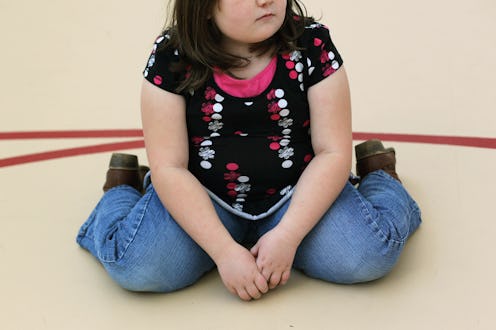News
Puerto Rico May Punish Parents Of Obese Children
Michelle Obama's efforts last year to increase healthy food options at school cafeterias were aimed at providing young people with more nutritious meal choices that correlated with fighting child obesity. Though her program wasn't universally greeted with open arms by the students themselves — in large part due to the less-than-savory appearance of the cafeteria lunches — one U.S. territory might soon take an even more drastic approach to combating the issue. A controversial law introduced in its senate could soon label Puerto Rican parents with obese children as "child abusers" and be forced to pay a fine.
Introduced by Senator Gilbert Rodriguez Valle — one of the younger, more popular politicians on the island — the bill would punish parents if it was determined that the child's obesity stemmed from parental neglect. Bizarrely, the authority to identify obese children and educate parents on its consequences lie with education officials. Parents would then be referred to Puerto Rico's health department and would work toward a plan for the child to lose weight. If officials determine that the child's condition has not improved after six months, child-family services would be contacted, and if the situation persists, it could result in fines of up to said $800, The Washington Post reported.
The proposal has been put to public debates, and there are many vocal opponents who say that child obesity does not indicate an inherent link to parental neglect or abuse, nor is such a bill an effective or realistic way to tackle the issue. Milly Garcia, a nutritionist who opposes the bill, criticized it as government overreach:
The fact that these childhood obesity cases are rooted in lifestyle does not give one the right to step into people’s private spaces. This is not abuse, it’s a disease. It would mean entering into a private area where the government does not belong. Obesity is the result of many factors and what we need to do is find solutions.
Dr. Ricardo Fontanet, president of the Puerto Rico chapter of the American Academy of Pediatrics, told The Guardian that though Sen. Valle is right in attempting to address the problem, there were a whole host of issues as to how the lawmaker is going about it:
[H]e's saying that if you have an obese child in the house, it’s synonymous with child abuse, and that’s completely wrong. You have to lose weight, sure, but to have the state coming to your home, looking at how you do things and charging you with child abuse is dangerous...
They’re not involving pediatricians, nutritionists, dieticians, the people who prepare the lunches in schools, in any of this. Teachers aren’t trained to identify obese children; they don’t have the time, the facilities or the knowledge. They’re asking people with no knowledge of dealing with obesity to identify these patients.
But Fontanet also added that in his discussions with Valle about the measure, Valle said that he did not actually expect the bill to be passed into law; he only wanted to "shake the tree so everyone sees this."
Puerto Rico has a dire obesity rate among the youth: more than 28 percent of children are considered obese — compared with around 18 percent in the mainland — and the figures point to what many call a national health crisis.
Image: Getty Images
